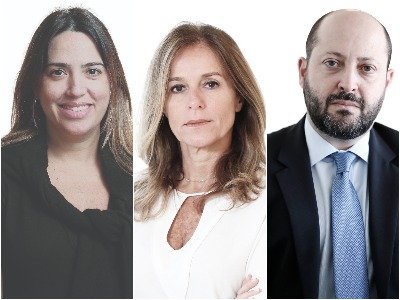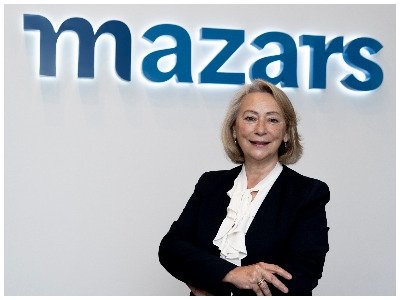Clean energy has a bright future

China Three Gorges, or CTG for short, is considered the biggest clean energy group in China and the most prominent hydropower developer in the world. It also happens to be the largest shareholder of Portuguese electric utilities company and giant, EDP – Energias de Portugal. Iberian lawyer had the pleasure of interviewing Luiza Bartholomei. A Brazilian national, Luiza is currently head of Legal and Compliance for the European business units of this Chinese stateowned power company. Iberian Lawyer asked Luiza about how the business has faired during the pandemic, and she revealed that M&A opportunities in the energy sector have actually increased, despite all being conducted remotely.
 During the pandemic, did the company carry out any emergency plan or action that you would like to share with us?
During the pandemic, did the company carry out any emergency plan or action that you would like to share with us?
Our company has been following the highest safety protocols for the pandemic situation since the beginning of the crisis. Even before the state of global calamity was declared, we had already received support and safety equipment from the headquarters, including the provision of masks, alcohol, thermometers and oximeters. We had training on control and prevention procedures, and every day we receive guidance and support. Employees have been working in a home-based regime since the beginning of 2020, and an internal committee was created to support and manage the situation throughout the territories in which the company operates.
You began your legal career in Brazil. How does that compare to working in Iberia and what were your motivations for relocating to Europe?
Since the beginning of my career, I’ve always worked in large corporations, in the area of legal consultancy for strategic projects and operations, with legal business evaluation, organisational structure, international contracts and M&A. Brazil is a multicultural territory, which includes, in one country, an immense variety of traditions and different forms of interaction and trade businesses. Thus, even if we are facing a transaction between home companies, there will always be peculiarities related to the region where each party originates from. In addition, it is a country that has a lot of business abroad, and imports and export products and technologies with all the territories in the world. Diversity has always been very present in all the projects in which I have worked. But I always had the desire to take a closer look at how the corporations functioned on the other side of the ocean. I decided to relocate to Europe to study this scenario in greater depth and for that reason I took my Master’s Degree in International Commercial Law in Portugal. When I entered the corporate market, I was able to experience the very close interaction between European countries (especially in the Iberian Peninsula) and to better understand how cross-border operations interact and integrate. In addition, working in a Chinese company, I experience on a daily basis the differences between the western way of working and the ancient millenary cultural structure. It is my great motivation and the best result I can get from my work.
Can you summarise the last 12 months and the impact that COVID-19 has had on China Three Gorges’ business?
The past 12 months have been truly challenging for the company’s business. Given that our growth strategy is based on acquisitions, the main focus is on M&A operations. This type of operation requires, substantially, a great interaction between the company’s business team, and the advisors hired to provide expert services on the workstreams, such as Legal, Tax, Finance and technical evaluation. Usually, those responsible are allocated to the projects and work together, side by side, from the Due Diligence phase until the closing of the transactions. And that format had to be completely revised in this period. Business opportunities continued to exist, but the way of doing business had to be reinvented. In addition, as these are transactions in the Energy sector, it is essential that the buyer has knowledge of the portfolio, equipment and technology deployed for the purposes of evaluation and negotiation. However, in a pandemic scenario of isolation, the company had to seek alternatives and carry out complete acquisition projects remotely, without the possibility of face-to-face discussions and interpersonal relationships between the parties. Despite this, we had two large projects successfully closed in the Spanish territory, and we continue with countless more projects in progress across the European territory, which demonstrates our commitment and ability to adapt to changes.
How has the renewable energy sector faired during the last 12 months?
The energy sector was one of the few businesses that did not suffer drastically in the pandemic period. The M&A processes themselves needed to be adjusted to the new “virtual and online” scenario, but the opportunities even increased in the last months. I expect that for the near future, the market will be more competitive, and the transactions will continue to grow in size and relevance.
How many people work in the legal department you lead today? Have you grown the team?
When I joined the company, I had only one person to assist me in the legal department. The specific and expert advice on legal matters is provided by our long term legal advisors contracted in the territories in which we carry our operations. I have now one more person on the team, as we have grown significantly our activities in the past year. My responsibility is to ensure that the company meets the highest levels of Compliance to all the E.U. rules and regulations and we have developed in this period all necessary internal policies and procedures to evaluate and control our activities, in order to meet the best market practices applicable to the sector. I manage all the legal advisors engaged in all of our projects and conduct all the relationships between our internal team (and the headquarters requirements) and third parties with which we have business and operations.
How do you select your external legal advisors? Do you have panels/have lawyers pitch regularly for work? How much do you value sector experience?
The selection of external advisors is based on a set of requirements, according to the specific purpose of the contract. Considering that we work on a very peculiar business, with a regulatory scenario and different rules applicable to the transactions (especially when it comes to international investment from foreign companies), it is essential that advisors have a wide knowledge on the subject and matters related to the evaluation that should be conducted. In this sense, I always search for the best-in-practice firms and consider the past experiences we have with previous projects/legal opinions provided. Our company has a well-designed and defined procurement process, with established criteria that we use to evaluate the proposals received whenever we launch an RFP in the market. We have an internal team to analyse and score the scope and conditions proposed by the advisors and our Management Committee takes the final decision according to my indication and suggestion.
What changes have you seen in the legal market in the way law firms communicate with GCs?
I’ve noticed that law firms are changing from the position of simple advisors to partners in the company’s business. I mean that the opinions that our experts deliver always take into consideration the company’s strategy (as we discuss and analyse jointly) in a way to find legal alternatives to make sure the goals could be achieved in the best way for the business results.
How is the legal tech evolution impacting your organisation and your relationship with external advisors?
I currently manage all of the relationships with the advisors in a remote way. The documents, signatures, approvals and all formalities are already done by electronic means. All of the relationships are conducted through web meetings and emails or online messages. This is already the reality. And for our company’s activities I do not believe it should drastically change, but only improve in some minor aspects. It works perfectly the way we do nowadays.
What is your biggest frustration when working with external law firms?
The most frustrating experience is when the advisor does not interact with our internal team and does not get personally involved in the company’s business. In those cases, the legal advice is always far from the company’s reality and necessity and can never reflect the best alternative for the proposed situation. The professional should understand the importance of the problem that is being taken and analyse as it is its own problem.
What do you value the most when working with external counsel?
I always value personal interactions. I like to work with people that I can communicate openly with and with whom I can establish a relationship based on trust and respect. I believe the advisors are not simply service providers, and in this sense I like the ones that see our company not only as a client, but as a strategic and important partner for their activities.
When was the last time a law firm really impressed you?
I must say that since I came to Europe, I’ve been positively surprised with all the firms that I’ve being working with. I’ve experienced a great level of knowledge and commitment to the projects presented and this has given me a great satisfaction in all the legal matters that I’ve dealt with since I arrived in the company.
To read the interview in full please download issue N.104
Interview by Michael Heron.












